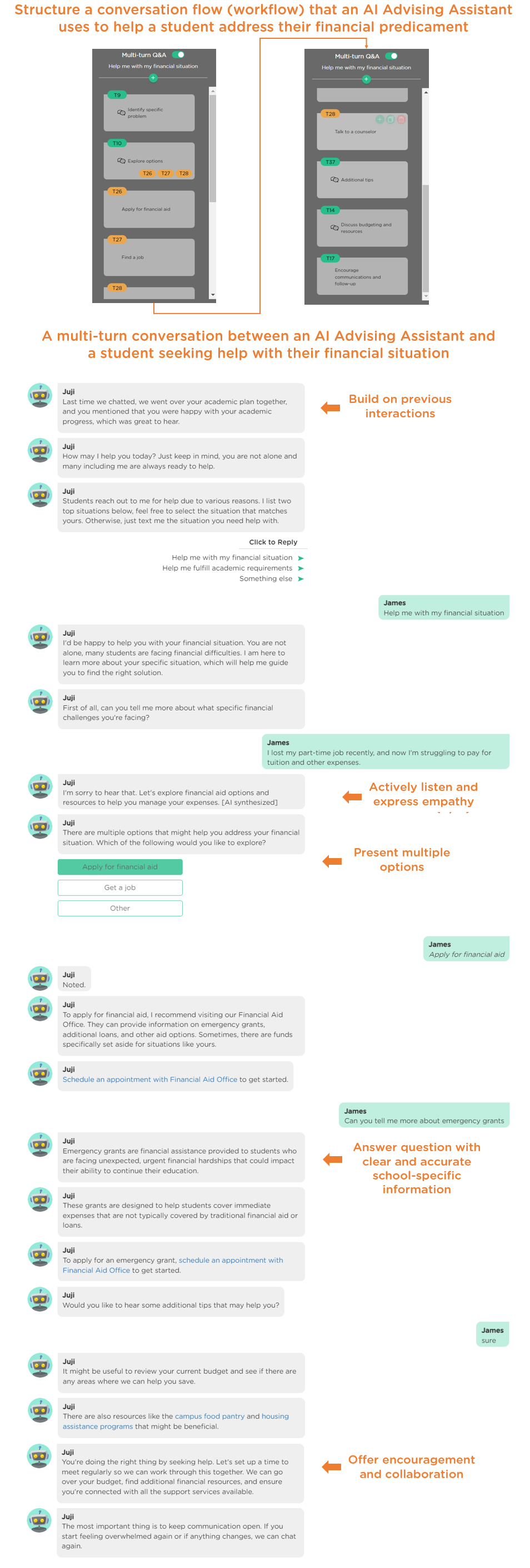In the rapidly evolving landscape of higher education, academic advising stands as a critical component in fostering student success. However, advisors often face numerous challenges, from managing large caseloads to providing personalized support. This blog delves into the transformative potential of AI in this domain. Below we first discuss three key challenges in academic advising and how AI can provide innovative solutions. Then we offer a practical guide on applying the NACADA Academic Advising Core Competencies Model to building effective AI Advising Assistants. Join us as we uncover how AI can revolutionize academic advising, making it more efficient, personalized, and impactful for students and advisors alike.
3 Challenges in Academic Advising and How AI Can Help
Academic advisors play a crucial role in guiding students through their educational journey, providing support in course selection, academic policies, and career opportunities, etc. With limited staffing resources relative to the growing number of students requiring individualized guidance, advisors often manage large caseloads, which leads to several challenges. Below we highlight the key challenges and outline how the adoption of AI can effectively address them.
Challenge 1: Quick, Transactional Conversations
Due to the large number of students, advisors often have to keep their meetings brief and focused on immediate issues, resulting in conversations that are more transactional rather than transformational.
AI Solution: Scale Up Academic Advising
AI can provide advice to students 24/7, allowing advisors to scale their services and increase accessibility. This enables advisors to allocate more time for in-depth, transformational conversations with students, enhancing the advising experience.
Challenge 2: Limited Personalization
The large number of students and limited resources make it difficult for advisors to provide personalized attention, affecting the quality of advice and support.
AI Solution: Offer Personalized Support
AI can offer personalized information on majors, associated careers, required skills, and job demands, and provide tailored recommendations based on individual needs and preferences. This allows advisors to focus on more complex and nuanced student issues and engage in deeper, more meaningful conversations with students.
Challenge 3: Efficiency Over Depth
Advisors often need to prioritize efficiency, focusing on quick solutions rather than exploring complex issues in depth.
AI Solution: Support Data-Informed Decisions
AI can analyze student data to provide advisors with a "cheat sheet" and help them identify areas where students need additional guidance, enabling more targeted, in-depth support.
How to Apply NACADA Academic Advising Core Competencies Model to Building AI Advising Assistants
The National Academic Advising Association (NACADA), the premier association for student success through academic advising in higher education, has developed the Academic Advising Core Competencies Model to help the professional development of academic advisors. As we look to the future of using AI to augment academic advising, the same framework can also be used to guide the design, implementation, and evaluation of AI Advising Assistants.
Below we highlight how to apply each component of this model to AI Advising Assistants.
1. Conceptual Component to Guide AI Conversation Flow (Workflow)
The conceptual component covers the ideas and theories that human advisors should use to effectively advise their students. These theories and approaches provide guidance for structuring the conversation of AI Advising Assistants, enabling them to emulate effective advising practices.
2. Informational Component to Build AI Knowledge Base
The informational component encompasses the knowledge that human advisors must acquire to guide students at their institution. This includes institution-specific history, mission, vision, values, curriculum, degree programs, policies, procedures, and campus resources. Feeding this body of knowledge to AI Advising Assistants allows them to provide informed and contextually accurate responses to student inquiries.
3. Relational Component to Guide Functionality Development and Evaluation
The relational component lists the skills that human advisors must have to deliver effective advising per the above two components. It provides a blueprint for developing and evaluating the functions of an AI Advising Assistant. For example, an AI Advising Assistant should build good relationships with students, and facilitate problem-solving, planning, and decision-making.
A Reference AI Advising Assitant
Juji Studio enables organizations like universities to build and operate custom proactive AI chatbots to automate high-touch human interactions like academic advising. Acting as assistants to human academic advisors, the chatbots help establish deeper and more meaningful connections between advisors and students. They reduce the workload of advisors by handling routine information requests, analyzing student data to understand individual strengths, needs, and preferences, and crafting personalized advice. Advisors can focus on developing more effective advising strategies, addressing complex situations, and guiding AI to ensure the quality of its content.
The images below illustrate a multi-turn conversation between an AI Advising Assistant built using Juji Studio and a student seeking help with their financial situation. Developed based on the Academic Advising Core Competencies Model, the AI Advising Assistant demonstrates its capability to build on previous interactions, actively listen to the student's concerns, and express empathy. The chat showcases how the AI Advising Assistant follows a structured conversation flow to present multiple options to address the problem, provide clear and accurate information, and offer encouragement and collaboration with the student to tackle the issue together.

By aligning development with the NACADA Academic Advising Core Competencies Model, institutions can ensure that the AI can support advisors in achieving the advising objectives.




